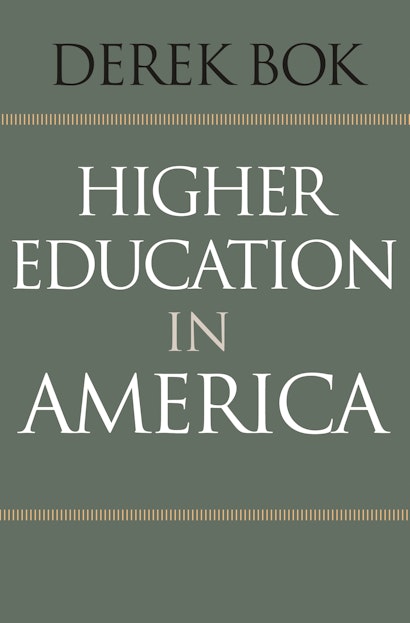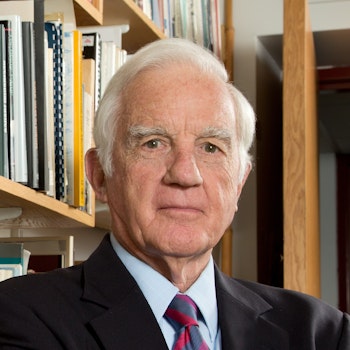Higher Education in America is a landmark work—a comprehensive and authoritative analysis of the current condition of our colleges and universities from former Harvard president Derek Bok, one of the nation’s most respected education experts. Sweepingly ambitious in scope, this is a deeply informed and balanced assessment of the many strengths as well as the weaknesses of American higher education today. At a time when colleges and universities have never been more important to the lives and opportunities of students or to the progress and prosperity of the nation, Bok provides a thorough examination of the entire system, public and private, from community colleges and small liberal arts colleges to great universities with their research programs and their medical, law, and business schools. Drawing on the most reliable studies and data, he determines which criticisms of higher education are unfounded or exaggerated, which are issues of genuine concern, and what can be done to improve matters.
Some of the subjects considered are long-standing, such as debates over the undergraduate curriculum and concerns over rising college costs. Others are more recent, such as the rise of for-profit institutions and massive open online courses (MOOCs). Additional topics include the quality of undergraduate education, the stagnating levels of college graduation, the problems of university governance, the strengths and weaknesses of graduate and professional education, the environment for research, and the benefits and drawbacks of the pervasive competition among American colleges and universities.
Offering a rare survey and evaluation of American higher education as a whole, this book provides a solid basis for a fresh public discussion about what the system is doing right, what it needs to do better, and how the next quarter century could be made a period of progress rather than decline.
"Magisterial."—Stanley Fish, New York Times
"A detailed progress report on the challenges and opportunities facing our nation's colleges and universities. . . . Competition among schools produces benefits and causes problems. Most of the important ones are addressed in Bok's helpful volume. I hope he is right that we already have the ingredients in place to make the necessary reforms. I know we need university leaders like him to help activate those ingredients so that American higher education can continue to contribute in vital ways to our culture, our economy and our polity."—Michael S. Roth, Washington Post
"A thought-provoking book that defies political stereotypes. Because of its nuances, the book is a refreshing change from the openly hostile diatribes attacking higher education in recent years."—Peter Sacks, Minding the Campus
"Bok draws on the latest empirical research to set the record straight about systems of governance, undergraduate education, doctoral programs, medical schools, law schools, and business schools, teaching, research, and tenure, tuition, financial aid, affirmative action, the role of government, inter-collegiate athletics, online education, for-profit institutions, and what he calls 'matters of genuine concern.' Comprehensive, judicious, probing, and immensely informative, written for students, parents, and taxpayers as well as 'insiders,' it is one of the best books to appear on this subject in decades."—Glenn Altschuler, Huffington Post
"Hold on to your mortarboard; [Higher Education in America has] got five fat sections on the state of instruction at the undergrad then graduate level, with umpteen analyses of market forces at each turn, plus five forewords and four afterwords! Despite this daunting breadth, Bok keeps it real."—Katharine Whittemore, Boston Globe
"[Higher Education in America is] a magisterial yet often contrarian assessment of challenges facing university governance, teaching, and, indeed, survival."—Jim Sleeper, Huffington Post
"In the past few years, UK government ministers have paid a lot of attention to the American higher education system, and some new ideas introduced in England, at least, have come directly from the US. Higher Education in America, written by a former president of Harvard University, serves to highlight the similarities between issues we face in the UK with those in the US. . . . Easy to read and comprehensive. . . . A useful overview of the state of US higher education in the early 21st century."—Mary Stuart, Times Higher Education
"Monumental. . . . [Bok's] assessment is measured and clear, and we may confidently refer young academics and administrators to Higher Education in America as a primer on current affairs."—Mark Bauerlein, Weekly Standard
"One theme that I found particularly useful in Higher Education in America is Bok's treatment of undergraduate education and curriculum. Bok underlines the value of a broad university education at every level—for the individual, for the business who hires him or her, and for the society. . . . The book is worth reading carefully by faculty leaders and university administrators as they make their best efforts to enhance the educational effectiveness of their programs."—Daniel Little, Understanding Society
"Derek Bok asks all the right questions about higher education, and his experience, research, and staggering intelligence pervade every page. The real value here lies in Bok's thorough examination of some of the most urgent challenges facing higher education—and in his spot-on recommendations for what needs to be done to address these concerns. This is an important book for both academics and families looking at a future in higher education."—Grandparents.com
"Highly recommended for education professionals, policy advocates, and the broad public as a thorough and thoughtful examination that assesses strengths and weaknesses and suggests paths to academic improvement."—Elizabeth Hayford, Library Journal
"Derek Bok . . . has a breathtaking grasp of higher education worldwide, and he states his positions in a lucid and learned manner. Moreover, he presents copious evidence to back his assertions so that the reader who wishes to challenge him knows precisely what data support his contentions."—Edward P. Sheridan, PsycCRITIQUES
"With more than two decades of service as president of Harvard University behind him, Derek Bok has views on higher education that must be taken seriously. . . . Now in Higher Education in America, the Harvard professor offers a comprehensive and up-to-date volume that gathers analysis of these and numerous other topics in one place."—Choice
"Ambitious and thought-provoking, Higher Education in America represents an informed and informative addition to ongoing debates at the national, state, and institutional levels about the aims higher education ought to aspire to and how best to achieve them."—David M. Brown & John Thelin, Teachers College Record
"The breadth of [Bok's] analysis allows him to address and to offer a balanced description of a multitude of issues plaguing American higher education. Rather than attempting to theorize one-size-fits-all strategies, Bok traces the framework of higher education as a whole and familiarizes readers with the respective strengths and weaknesses of a variety of possible solutions to the diverse range of challenges facing American colleges and universities today."—Preston Waltrip, South Central Review
"This is an exceedingly ambitious book. In fact, I know of nothing remotely comparable to it in scope or scale. One of its many refreshing aspects is its unfailing common sense. Bok presents the most balanced account of American higher education that I know of, stating clearly the many things that are right about it, but also highlighting problems and challenges. He has an unerring eye for the right 'big questions,' and readers of all kinds will appreciate his focus on these questions."—William G. Bowen, president emeritus of Princeton University
"Informative, provocative, and engaging, this is a very important book that should be of great interest not only to those working in higher education but to everyone else who is concerned about the future of America's colleges and universities. Its value lies in Bok's thorough analysis of some of the most urgent challenges facing higher education—and in his recommendations for actions to address them."—James J. Duderstadt, president emeritus of the University of Michigan
"This book is like a very thorough checkup of a patient by an expert physician. Bok inspects nearly every major organ of the U.S. higher education system, provides a carefully balanced report on each, and concludes that the patient is in good overall health but showing signs of misuse and neglect in certain parts. The book includes exceptionally valuable observations about the system's strengths and weaknesses—and about remedies for some of its problems."—Steven G. Brint, vice provost of the University of California, Riverside
"This is a major contribution to the literature on American higher education. It provides unusually comprehensive coverage and addresses controversies in an exemplary manner, fairly representing different positions and relying on empirical research to reach conclusions. I think this book will have a broad appeal throughout higher education. I can envision most administrators having a copy on their bookshelves, a ready reference and guide for their own pronouncements on the state of higher education."—Roger L. Geiger, Pennsylvania State University


